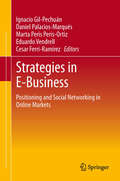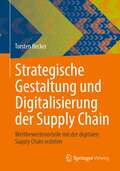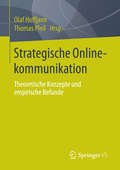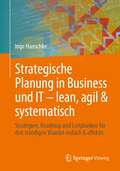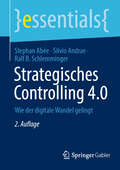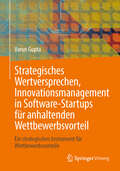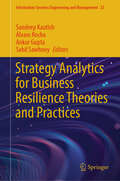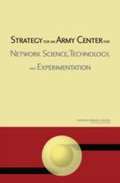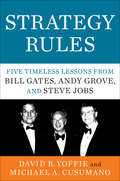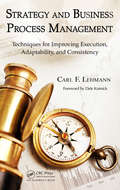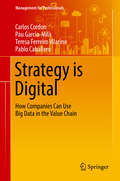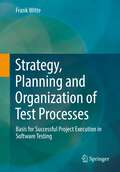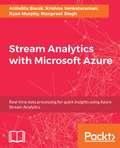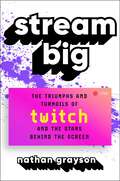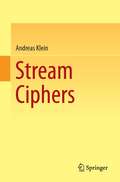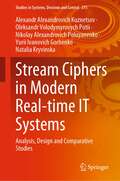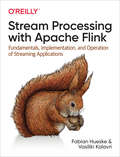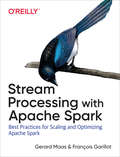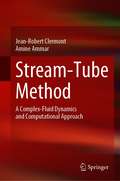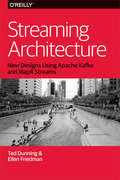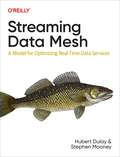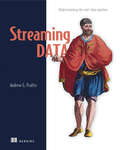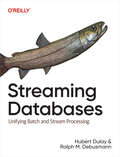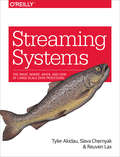- Table View
- List View
Strategies in E-Business
by Ignacio Gil-Pechuán Daniel Palacios-Marqués Marta Peris Peris-Ortiz Eduardo Vendrell Cesar Ferri-RamirezIn this volume, the authors apply insights from a variety of perspectives to explore the alignment among strategy, organization design, process and human resource management, and e-business practices on developing successful social networking programs--with particular regard to applying such initiatives against the backdrop of the global financial crisis and challenges to traditional business models. Showcasing in-depth case studies, the authors present emerging approaches to analyze the impact of investment in social networking sites, aligning internal resources, and measuring effects on positioning, branding, and new business creation. The fact that a growing proportion of the world population has a relationship with social networking sites could prove very valuable for companies. The question is whether this represents a business opportunity, whether companies know how to make the most of it and if they will make the necessary efforts to adapt to these new platforms. In the modern world, social networking sites have enormous potential for large as well as small and medium-sized enterprises (SMEs); most companies are aware of the need for a presence on social networking sites, but at present their e-business strategies are part of their medium and long-term strategic planning and only a small percentage have been put into practice. In short, this book attempts to answer the following questions: Is there a business opportunity for companies on social networking sites? Do they know how to make the most of it? Are they willing to make the necessary effort to adapt? Can e-business strategies contribute to company creation and the success of already existing businesses? And if so, how?
Strategische Gestaltung und Digitalisierung der Supply Chain: Wettbewerbsvorteile mit der digitalen Supply Chain erzielen
by Torsten BeckerDigitale Supply Chains steigern die Wettbewerbsfähigkeit von Unternehmen. Eine systematische Vorgehensweise beschreibt die Entwicklung von Strategien, um mit der Supply Chain und deren Digitalisierung herausfordernde Unternehmensziele zu erreichen. Dazu zählen die bessere Erfüllung von Kundenanforderungen, Umsatzsteigerung und gleichzeitig Kostensenkung. Strategiemuster werden vorgestellt und deren Umsetzung in Unternehmen beschrieben. Unternehmer, Supply-Chain- und Operations-Führungskräfte erhalten einen praxisorientierten Leitfaden, wie sie Ihr Unternehmen für die Zukunft ausrichten können. Die vorgestellten, praxiserprobten Methoden und Ansätze beschleunigen und erleichtern nicht nur die Strategieentwicklung, sondern auch deren Umsetzung und die Unterstützung durch digitale Lösungen.Dabei stehen Make-/Buy-Entscheidungen, Lösungen für Entscheidung über Fähigkeiten, die digitale Lösungen in der Produktionstechnik (3D-Druck) sowie die Auswirkungen von Industrie 4.0 und Umweltaspekten auf die Supply Chain im Fokus. Praxisbeispiele zeigen, wie neue Lösungskonzepte die Auslegung von zukunftsgerichteten Supply Chains unterstützen. Ebenso werden die Triggerpunkte vorgestellt, die eine erfolgreiche Supply Chain in Frage stellen könnten, sowie die Gestaltung zur Zeit- und Kostenoptimierung in der Gesamtkette. Wie muss ein Unternehmen die historisch gewachsene Supply Chain grundsätzlich in Frage stellen? Was ist wichtig bei einer Supply Chain Optimierung? Die Betrachtung gilt den Strategien, die die Prozesse, Architekturen, die Nutzung digitaler Technologien, den Ressourceneinsatz bestimmen - unter Berücksichtigung der übergeordneten Unternehmensstrategie, die kürzere Lieferzeiten und geringeren Kosten fordert, um wettbewerbsfähig bleiben zu können. Es wird eine Handlungsanleitung zur strategischen Gestaltung für digitale Supply Chains vorgestellt.
Strategische Onlinekommunikation
by Olaf Hoffjann Thomas PleilOnlinekommunikation und speziel Social Media sind als besonders wichtige Herausforderungen des Kommunikationsmanagements erkannt. Kaum ein Unternehmen verzichtet mittlerweile auf die Beobachtung von Diskussionen im Internet und die Umsetzung eigener Kommunikationsstrategien im Social Web. Dort verändern sich für die PR und die Organisationskommunikation zentrale Aspekte: Öffentlichkeiten können heute sehr viel schneller entstehen. Es sind neue Formen der Meinungsbildung zu beobachten, die zunehmend weniger den Mechanismen der Massenkommunikation folgen, sondern Ergebnis netzwerkartiger Prozesse sind. In diesem Umfeld entstehen gleichzeitig neue Formen der Beteiligung, die durch entsprechende niederschwellige Instrumente im Internet erst ermöglicht werden. Aus Organisationssicht verändern sich damit unter anderem Entstehung und Pflege von Reputation oder das Management von Stakeholderbeziehungen. Zehn Jahre nach Beginn der Fachdiskussion zu PR und sozialen Medien gibt dieser Band auf Basis aktueller Untersuchungen Einblick in die Praxis und in aktuelle Herausforderungen der Organisationskommunikation im Internet.
Strategische Planung in Business und IT – lean, agil & systematisch: Strategien, Roadmap und Leitplanken für den ständigen Wandel einfach & effektiv
by Inge HanschkeMit diesem Buch erhalten Sie kompaktes Wissen zur Ausrichtung der IT an den Geschäftserfordernissen:- Geschäftstreiber verstehen und nachvollziehbar dokumentieren- Systematisch Anforderungen an die IT ableitenMit dem Ziel-Bild vor Augen und der Roadmap für die Umsetzung gestalten Sie die digitale Transformation – vom Business bis zur technischen Umsetzung. Schaffen Sie so die organisatorischen Voraussetzungen für die strategische IT-Planung. Dashboards und KPIs zur wirksamen Steuerung der Umsetzung der Planung sind dabei wichtige Hilfsmittel. Ein Schritt-für-Schritt-Leitfaden und ein ausführliches Glossar unter-stützen Sie bei Ihrer Arbeit.
Strategisches Controlling 4.0: Wie der digitale Wandel gelingt (essentials)
by Stephan Abée Silvio Andrae Ralf B. SchlemmingerDie Digitalisierung verändert Wertschöpfungsketten in Unternehmen grundlegend und beeinflusst in vielen Fällen sogar komplette Geschäftsmodelle. Diese Entwicklungen haben auch erhebliche Auswirkungen auf die Unternehmenssteuerung und damit auch auf das Controlling. Das Buch präsentiert eine Systematik, die zeigt, wie das strategische Controlling die Chancen der Digitalisierung nutzen kann, und beschreibt die Entwicklungspfade hin zu einem „Strategischen Controlling 4.0".
Strategisches Wertversprechen, Innovationsmanagement in Software-Startups für anhaltenden Wettbewerbsvorteil: Ein strategisches Instrument für Wettbewerbsvorteile
by Varun GuptaDieses Buch hat zum Ziel, die Erfolgsquoten von Startups zu erhöhen, indem es sich auf die Innovation des Wertversprechens konzentriert. Dies wird vorangetrieben durch die Einbindung potenzieller Verbraucher sowie anderer Ressourcen wie Freiberufler und strategischer Partnerschaften mit der Akademie. Der Autor zeigt, wie Startups, die in Bezug auf Ressourcen eingeschränkt sind, Anstrengungen unternehmen können, um das Potenzial ihres Produktmarktes zu erkunden. Dabei wird auch untersucht, wie globale Märkte für den Erfolg eines Startups vorteilhaft sein können, während gleichzeitig Lösungen für schwer zugängliche Märkte aufgezeigt werden. Das Buch untersucht das Gewinnen von Wissen, das von Freiberuflern, Kunden und der Akademie geteilt wird, deren Beteiligung entscheidend sein kann, um Aktivitäten der Wertversprechen-Innovation wie Ideenentwicklung, Umsetzung und Vermarktung zu unterstützen. In Kombination führt der Autor die Leser dazu, ihre Fähigkeit zu entdecken, Wertversprechen-Innovationen zu fördern, die langfristige Wettbewerbsvorteile in einer stark schwankenden Geschäftsumgebung zur Folge haben.
Strategy Analytics for Business Resilience Theories and Practices (Information Systems Engineering and Management #33)
by Ankur Gupta Álvaro Rocha Sandeep Kautish Sahil SawhneyA strategy is a blueprint of actions taken by managers to achieve the organization’s mission and vision and other long-term goals. In long term, strategy determines the success of an organization. While evaluating strategy, a company is essentially asking itself, “Where we are heading to and how we will achieve our goals?” Strategy Analytics is a relatively new field in conjunction with Strategic Management and Business Intelligence. Generally, Strategic Management field deals with the enhancement of the decision-making capabilities of managers. Typically, such decision-making processes are heavily dependent upon various internal and external reports. Managers need to develop their strategies using clear strategy processes supported by the increasing availability of data. This situation calls for a different approach to strategy, such as integration with analytics, as the science of extracting value from data and structuring complex problems. The term Strategic Analytics implies decisions are made, resources are invested, and plans for data and analytics are created based on the needs and critical questions a business is facing. The need for analytical solutions in today’s business environment is crucial because they allow users to think strategically about how an organization builds its core competencies and creates value. This not only informs the entire process, saves a lot of time, effort, and money, but also leads to value creation. This book will be one reference source to academic fraternity, management practitioners, business analysts and research students who are interesting in Strategic Analytics domain and using it in their research/practice work. In addition, the proposed book will be serving as state-of-art documentation of Strategy Analytics, its present role around organizational outcomes and outlines the need for greater integration in organization strategy and analytics for better strategic decision processes to measure corporate performance and business value creation. Distinguished Features of the proposed book State-of-art documentation of Strategy Analytics for Business Resilience and their applications for all levels of managerial positions. Excellent reference material for academic scientists, researcher and research scholars working in modern Strategy Analytics and Information Systems. This book will showcase the recent innovations, trends, and concerns as well as applied challenges encountered, and solutions adopted in the fields of Strategy Analytics
Strategy For An Army Center For Network Science, Technology, And Experimentation
by National Research Council of the National AcademiesThe U.S. military has committed to a strategy of network-centric warfare. As a result, the Army has become increasingly interested in the critical role of network science. To a significant extent, this interest was stimulated by an earlier NRC report, Network Science. To build on that book, the Army asked the NRC to conduct a study to define advanced operating models and architectures for future Army laboratories and centers focused on network science, technologies, and experimentation (NSTE). The challenges resulting from base realignment and closure (BRAC) relocations of Army research, development, and engineering resources--as they affected the NSTE program--were also to be a focus of the study. This book provides a discussion of what NSTE is needed by the Army; an examination of the NSTE currently carried out by the Army; an assessment of needed infrastructure resources for Army NSTE; and an analysis of goals, models, and alternatives for an NSTE center.
Strategy Rules
by David B. Yoffie Michael A. CusumanoBetween 1968 and 1976, Bill Gates, Andy Grove, and Steve Jobs launched three companies that would define the world of high technology, create more than a trillion dollars in value, and transform our lives. How did they realize these incredible achievements? Strategy Rules examines these three individuals collectively for the first time--their successes and failures, comonalities and differences--revealing the business strategies and practices they pioneered while building their firms.Eminent business professors David Yoffie and Michael Cusumano have studied these three leaders and their companies for nearly thirty years, while teaching business strategy, innovation, and entrepreneurship at Harvard Business School and the MIT Sloan School of Management. In this enlightening guide, they show how Gates, Grove, and Jobs became masters of strategy. As CEOs, each approached strategy and execution in remarkably similar ways--yet markedly differently from their erstwhile competitors--keeping their focus on five rules: Look Forward, Reason Back: They determined where they want their companies to be in the future and could "reason back" to identify the moves that would take them there. Make Big Bets, Without Betting the Company: All three men made enormous strategic bets but rarely took gambles that put the financial viability of their companies at undue risk. Build Platforms and Ecosystems: Technology leaders have to create industry platforms that enable other firms to create complementary products and services that make the platforms increasingly valuable. Exploit Leverage and Power: Gates, Grove, and Jobs often turned opponents' strengths into weaknesses and used enormous resources (once they had them) to dominate competitors. Shape the Company around Your Personal Anchor: From Gates' understanding of software to Grove's devotion to process discipline and Jobs' obsession with design, all three built their companies around their personal strengths while compensating for their weaknesses.Strategy Rules brings together the best practices in strategic management and high-tech entrepreneurship, providing unique insights for start-up executives as well as the heads of modern multinationals.
Strategy and Business Process Management: Techniques for Improving Execution, Adaptability, and Consistency
by Carl F. LehmannThis book prepares readers to master an IT and managerial discipline quickly gaining momentum in organizations of all sizes - Business Process Management (BPM). It describes how BPM treats processes as a portfolio of strategic assets that create and deliver customer and shareholder value and adapt, when necessary, enabling competitive advantage thr
Strategy in the Age of Disruption: A Handbook to Anticipate Change and Make Smart Decisions
by Henrik Von Scheel Ciprian Popa Joshua Von ScheelSeize your place in a new era in commerce and industry In Strategy in The Age of Disruption, a team of dedicated strategists delivers an exciting and practical guide to Industry 4.0, a commercial transformation that’s impacting every facet of the market, the environment, and our social lives. You’ll learn what Industry 4.0 is, what it means for you and your company, and how you—as a leader, manager, expert, entrepreneur, or investor—can capitalize on it and put it into practice. This is a complete handbook on strategic execution. It’s a step-by-step tutorial designed to get you to clearly see your strategic position, the choices available to you, and how to execute on those choices. You’ll also find: Ways to move beyond outdated business models that no longer serve the companies that follow them Common myths about strategy and how to put them to bed for good Deep and insightful explanations of the fourth industrial revolution and what it means for your sector and companyHighly visual and endlessly engaging, Strategy in The Age of Disruption will systematically guide you through how to manage the challenges of the present and the promise of the future.
Strategy is Digital
by Carlos Cordon Pau Garcia-Milà Teresa Ferreiro Vilarino Pablo CaballeroThis book presentsstrategies and practices to allow everyday companies to cope with thefundamentally changing landscape of business models and to take advantage ofthe huge business opportunities arising from the advent of big data. Itdevelops several case studies from companies in traditional industries likeLEGO, Yamato and Mediq, but also examines small start-ups like Space Tango,which is partnering with major multinationals to develop new business modelsusing big data. The book argues that businesses need to adapt and embark ontheir big data journey, helps them take the first step, and guides them alongtheir way. It presents successful examples and deducts essential takeawaylessons from them, equipping executives to capitalize on big data and enablingthem to make intelligent decisions in the big data transformation, giving theircompanies an essential competitive edge.
Strategy, Planning and Organization of Test Processes: Basis for Successful Project Execution in Software Testing
by Frank WitteThe book provides concrete tips for the successful organization of software tests. Because: Planning and conception in advance are essential for successful test projects. Setting the right course prevents problems from the outset and highlights the need for action in software testing. In addition to theoretical basics, this work shows the implementation in practice and deals with typical problems. Frank Witte explains the decisive aspects to be considered in the test concept in order to optimally support and accompany the test process.This book is a translation of the original German 1st edition Strategie, Planung und Organisation von Testprozessen by Frank Witte, Springer Fachmedien Wiesbaden GmbH, part of Springer Nature in 2020. The translation was done with the help of artificial intelligence (machine translation by the service DeepL.com). A subsequent human revision was done primarily in terms of content, so that the book will read stylistically differently from a conventional translation. Springer Nature works continuously to further the development of tools for the production of books and on the related technologies to support the authors.
Stream Analytics with Microsoft Azure
by Manpreet Singh Anindita Basak Krishna Venkataraman Ryan MurphyDevelop and manage effective real-time streaming solutions by leveraging the power of Microsoft Azure About This Book • Analyze your data from various sources using Microsoft Azure Stream Analytics • Develop, manage and automate your stream analytics solution with Microsoft Azure • A practical guide to real-time event processing and performing analytics on the cloud Who This Book Is For If you are looking for a resource that teaches you how to process continuous streams of data in real-time, this book is what you need. A basic understanding of the concepts in analytics is all you need to get started with this book What You Will Learn • Perform real-time event processing with Azure Stream Analysis • Incorporate the features of Big Data Lambda architecture pattern in real-time data processing • Design a streaming pipeline for storage and batch analysis • Implement data transformation and computation activities over stream of events • Automate your streaming pipeline using Powershell and the .NET SDK • Integrate your streaming pipeline with popular Machine Learning and Predictive Analytics modelling algorithms • Monitor and troubleshoot your Azure Streaming jobs effectively In Detail Microsoft Azure is a very popular cloud computing service used by many organizations around the world. Its latest analytics offering, Stream Analytics, allows you to process and get actionable insights from different kinds of data in real-time. This book is your guide to understanding the basics of how Azure Stream Analytics works, and building your own analytics solution using its capabilities. You will start with understanding what Stream Analytics is, and why it is a popular choice for getting real-time insights from data. Then, you will be introduced to Azure Stream Analytics, and see how you can use the tools and functions in Azure to develop your own Streaming Analytics. Over the course of the book, you will be given comparative analytic guidance on using Azure Streaming with other Microsoft Data Platform resources such as Big Data Lambda Architecture integration for real time data analysis and differences of scenarios for architecture designing with Azure HDInsight Hadoop clusters with Storm or Stream Analytics. The book also shows you how you can manage, monitor, and scale your solution for optimal performance. By the end of this book, you will be well-versed in using Azure Stream Analytics to develop an efficient analytics solution that can work with any type of data. Style and approach A comprehensive guidance on developing real-time event processing with Azure Stream Analysis
Stream Big: The Triumphs and Turmoils of Twitch and the Stars Behind the Screen
by Nathan GraysonTold through the diverse and fascinating careers of nine streamers, this is the definitive story of Twitch and how the livestream platform revolutionized technology, entertainment, business, and pop culture. With 2.5 million viewers at any given moment, the streaming platform Twitch is in the lead and often well beyond mainstream networks like CNN and Fox during primetime. On Twitch, the Amazon-owned tech behemoth, the biggest personalities, like Kai Cenat, Félix &“xQc&” Lengyel, and Hasan &“HasanAbi&” Piker, can earn millions per year by firing up their internet connection and going live. Veteran technology and gaming journalist Nathan Grayson takes us inside the triumphs and tribulations of Twitch with exclusive access to its biggest content creators who helped make the platform into a billion-dollar global business. From Twitch&’s early days of rapid growth to acquisition by Amazon to the defection of creators and rival platforms, Grayson makes the radical argument that many social technology companies are far more dependent on their creators than the creators are on their platforms. Rivetingly told through nine exceptional Twitch creators whose on-screen personalities helped the company grow into a powerhouse, this is the explosive story of when entertainment meets the internet in the era of social and video content domination.
Stream Ciphers
by Andreas KleinIn cryptography, ciphers is the technical term for encryption and decryption algorithms. They are an important sub-family that features high speed and easy implementation and are an essential part of wireless internet and mobile phones. Unlike block ciphers, stream ciphers work on single bits or single words and need to maintain an internal state to change the cipher at each step. Typically stream ciphers can reach higher speeds than block ciphers but they can be more vulnerable to attack. Here, mathematics comes into play. Number theory, algebra and statistics are the key to a better understanding of stream ciphers and essential for an informed decision on their safety. Since the theory is less developed, stream ciphers are often skipped in books on cryptography. This book fills this gap. It covers the mathematics of stream ciphers and its history, and also discusses many modern examples and their robustness against attacks. Part I covers linear feedback shift registers, non-linear combinations of LFSRs, algebraic attacks and irregular clocked shift registers. Part II studies some special ciphers including the security of mobile phones, RC4 and related ciphers, the eStream project and the blum-blum-shub generator and related ciphers. Stream Ciphers requires basic knowledge of algebra and linear algebra, combinatorics and probability theory and programming. Appendices in Part III help the reader with the more complicated subjects and provides the mathematical background needed. It covers, for example, complexity, number theory, finite fields, statistics, combinatorics. Stream Ciphers concludes with exercises and solutions and is directed towards advanced undergraduate and graduate students in mathematics and computer science.
Stream Ciphers in Modern Real-time IT Systems: Analysis, Design and Comparative Studies (Studies in Systems, Decision and Control #375)
by Natalia Kryvinska Alexandr Alexandrovich Kuznetsov Oleksandr Volodymyrovych Potii Nikolay Alexandrovich Poluyanenko Yurii Ivanovich GorbenkoThis book provides the most complete description, analysis, and comparative studies of modern standardized and most common stream symmetric encryption algorithms, as well as stream modes of symmetric block ciphers. Stream ciphers provide an encryption in almost real-time regardless of the volume and stream bit depth of converted data, which makes them the most popular in modern real-time IT systems. In particular, we analyze the criteria and performance indicators of algorithms, as well as the principles and methods of designing stream ciphers. Nonlinear-feedback shift registers, which are one of the main elements of stream ciphers, have been studied in detail. The book is especially useful for scientists, developers, and experts in the field of cryptology and electronic trust services, as well as for the training of graduate students, masters, and bachelors in the field of information security.
Stream Processing with Apache Flink: Fundamentals, Implementation, and Operation of Streaming Applications
by Fabian Hueske Vasiliki KalavriGet started with Apache Flink, the open source framework that powers some of the world’s largest stream processing applications. With this practical book, you’ll explore the fundamental concepts of parallel stream processing and discover how this technology differs from traditional batch data processing.Longtime Apache Flink committers Fabian Hueske and Vasia Kalavri show you how to implement scalable streaming applications with Flink’s DataStream API and continuously run and maintain these applications in operational environments. Stream processing is ideal for many use cases, including low-latency ETL, streaming analytics, and real-time dashboards as well as fraud detection, anomaly detection, and alerting. You can process continuous data of any kind, including user interactions, financial transactions, and IoT data, as soon as you generate them.Learn concepts and challenges of distributed stateful stream processingExplore Flink’s system architecture, including its event-time processing mode and fault-tolerance modelUnderstand the fundamentals and building blocks of the DataStream API, including its time-based and statefuloperatorsRead data from and write data to external systems with exactly-once consistencyDeploy and configure Flink clustersOperate continuously running streaming applications
Stream Processing with Apache Spark: Mastering Structured Streaming and Spark Streaming
by Gerard Maas Francois GarillotBefore you can build analytics tools to gain quick insights, you first need to know how to process data in real time. With this practical guide, developers familiar with Apache Spark will learn how to put this in-memory framework to use for streaming data. You’ll discover how Spark enables you to write streaming jobs in almost the same way you write batch jobs.Authors Gerard Maas and François Garillot help you explore the theoretical underpinnings of Apache Spark. This comprehensive guide features two sections that compare and contrast the streaming APIs Spark now supports: the original Spark Streaming library and the newer Structured Streaming API.Learn fundamental stream processing concepts and examine different streaming architecturesExplore Structured Streaming through practical examples; learn different aspects of stream processing in detailCreate and operate streaming jobs and applications with Spark Streaming; integrate Spark Streaming with other Spark APIsLearn advanced Spark Streaming techniques, including approximation algorithms and machine learning algorithmsCompare Apache Spark to other stream processing projects, including Apache Storm, Apache Flink, and Apache Kafka Streams
Stream-Tube Method: A Complex-Fluid Dynamics and Computational Approach
by Jean-Robert Clermont Amine AmmarThis book presents the stream-tube method (STM), a method offering computational means of dealing with the two- and three-dimensional properties of numerous incompressible materials in static and dynamic conditions. The authors show that the kinematics and stresses associated with the flow and deformation in such materials can be treated by breaking the system down into simple computational sub-domains in which streamlines are straight and parallel and using one or two mapping functions in steady-state and non-steady-state conditions.The STM is considered for various problems in non-Newtonian fluid mechanics with different geometries. The book makes use of examples and applications to illustrate the use of the STM. It explores the possibilities of computation on simple mapped rectangular domains and three-dimensional parallel-piped domains under different conditions. Complex materials with memory are considered simply without particle tracking problems.Readers, including researchers, engineers and graduate students, with a foundational knowledge of calculus, linear algebra, differential equations and fluid mechanics will benefit most greatly from this book.
Streaming Architecture: New Designs Using Apache Kafka and MapR Streams
by Ellen Friedman Ted DunningMore and more data-driven companies are looking to adopt stream processing and streaming analytics. With this concise ebook, you’ll learn best practices for designing a reliable architecture that supports this emerging big-data paradigm.Authors Ted Dunning and Ellen Friedman (Real World Hadoop) help you explore some of the best technologies to handle stream processing and analytics, with a focus on the upstream queuing or message-passing layer. To illustrate the effectiveness of these technologies, this book also includes specific use cases.Ideal for developers and non-technical people alike, this book describes:Key elements in good design for streaming analytics, focusing on the essential characteristics of the messaging layerNew messaging technologies, including Apache Kafka and MapR Streams, with links to sample codeTechnology choices for streaming analytics: Apache Spark Streaming, Apache Flink, Apache Storm, and Apache ApexHow stream-based architectures are helpful to support microservicesSpecific use cases such as fraud detection and geo-distributed data streamsTed Dunning is Chief Applications Architect at MapR Technologies, and active in the open source community. He currently serves as VP for Incubator at the Apache Foundation, as a champion and mentor for a large number of projects, and as committer and PMC member of the Apache ZooKeeper and Drill projects. Ted is on Twitter as @ted_dunning.Ellen Friedman, a committer for the Apache Drill and Apache Mahout projects, is a solutions consultant and well-known speaker and author, currently writing mainly about big data topics. With a PhD in Biochemistry, she has years of experience as a research scientist and has written about a variety of technical topics. Ellen is on Twitter as @Ellen_Friedman.
Streaming Data Mesh: A Model for Optimizing Real-Time Data Services
by Stephen Mooney Hubert DulayData lakes and warehouses have become increasingly fragile, costly, and difficult to maintain as data gets bigger and moves faster. Data meshes can help your organization decentralize data, giving ownership back to the engineers who produced it. This book provides a concise yet comprehensive overview of data mesh patterns for streaming and real-time data services.Authors Hubert Dulay and Stephen Mooney examine the vast differences between streaming and batch data meshes. Data engineers, architects, data product owners, and those in DevOps and MLOps roles will learn steps for implementing a streaming data mesh, from defining a data domain to building a good data product. Through the course of the book, you'll create a complete self-service data platform and devise a data governance system that enables your mesh to work seamlessly.With this book, you will:Design a streaming data mesh using KafkaLearn how to identify a domainBuild your first data product using self-service toolsApply data governance to the data products you createLearn the differences between synchronous and asynchronous data servicesImplement self-services that support decentralized data
Streaming Data: Understanding the real-time pipeline
by Andrew PsaltisSummaryStreaming Data introduces the concepts and requirements of streaming and real-time data systems. The book is an idea-rich tutorial that teaches you to think about how to efficiently interact with fast-flowing data.Purchase of the print book includes a free eBook in PDF, Kindle, and ePub formats from Manning Publications.About the TechnologyAs humans, we're constantly filtering and deciphering the information streaming toward us. In the same way, streaming data applications can accomplish amazing tasks like reading live location data to recommend nearby services, tracking faults with machinery in real time, and sending digital receipts before your customers leave the shop. Recent advances in streaming data technology and techniques make it possible for any developer to build these applications if they have the right mindset. This book will let you join them.About the BookStreaming Data is an idea-rich tutorial that teaches you to think about efficiently interacting with fast-flowing data. Through relevant examples and illustrated use cases, you'll explore designs for applications that read, analyze, share, and store streaming data. Along the way, you'll discover the roles of key technologies like Spark, Storm, Kafka, Flink, RabbitMQ, and more. This book offers the perfect balance between big-picture thinking and implementation details.What's InsideThe right way to collect real-time dataArchitecting a streaming pipelineAnalyzing the dataWhich technologies to use and whenAbout the ReaderWritten for developers familiar with relational database concepts. No experience with streaming or real-time applications required.About the AuthorAndrew Psaltis is a software engineer focused on massively scalable real-time analytics.Table of ContentsPART 1 - A NEW HOLISTIC APPROACHIntroducing streaming dataGetting data from clients: data ingestionTransporting the data from collection tier: decoupling the data pipelineAnalyzing streaming dataAlgorithms for data analysisStoring the analyzed or collected dataMaking the data availableConsumer device capabilities and limitations accessing the dataPART 2 - TAKING IT REAL WORLDAnalyzing Meetup RSVPs in real time
Streaming Databases: Unifying Batch and Stream Processing
by Hubert Dulay Ralph Matthias DebusmannReal-time applications are becoming the norm today. But building a model that works properly requires real-time data from the source, in-flight stream processing, and low latency serving of its analytics. With this practical book, data engineers, data architects, and data analysts will learn how to use streaming databases to build real-time solutions.Authors Hubert Dulay and Ralph M. Debusmann take you through streaming database fundamentals, including how these databases reduce infrastructure for real-time solutions. You'll learn the difference between streaming databases, stream processing, and real-time online analytical processing (OLAP) databases. And you'll discover when to use push queries versus pull queries, and how to serve synchronous and asynchronous data emanating from streaming databases.This guide helps you:Explore stream processing and streaming databasesLearn how to build a real-time solution with a streaming databaseUnderstand how to construct materialized views from any number of streamsLearn how to serve synchronous and asynchronous dataGet started building low-complexity streaming solutions with minimal setup
Streaming Systems: The What, Where, When, and How of Large-Scale Data Processing
by Tyler Akidau Slava Chernyak Reuven LaxStreaming data is a big deal in big data these days. As more and more businesses seek to tame the massive unbounded data sets that pervade our world, streaming systems have finally reached a level of maturity sufficient for mainstream adoption. With this practical guide, data engineers, data scientists, and developers will learn how to work with streaming data in a conceptual and platform-agnostic way.Expanded from Tyler Akidau’s popular blog posts "Streaming 101" and "Streaming 102", this book takes you from an introductory level to a nuanced understanding of the what, where, when, and how of processing real-time data streams. You’ll also dive deep into watermarks and exactly-once processing with co-authors Slava Chernyak and Reuven Lax.You’ll explore:How streaming and batch data processing patterns compareThe core principles and concepts behind robust out-of-order data processingHow watermarks track progress and completeness in infinite datasetsHow exactly-once data processing techniques ensure correctnessHow the concepts of streams and tables form the foundations of both batch and streaming data processingThe practical motivations behind a powerful persistent state mechanism, driven by a real-world exampleHow time-varying relations provide a link between stream processing and the world of SQL and relational algebra
